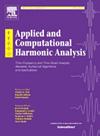散射卷积网络中的能量传播可以是任意慢的
IF 3.2
2区 数学
Q1 MATHEMATICS, APPLIED
引用次数: 0
摘要
我们分析了使用Mallat小波散射变换作为特征提取器的深度卷积神经网络的能量衰减。对于基于Gabor滤波器的时频散射变换,先前的工作已经确定了任意平方可积输入信号的能量衰减是指数的。相反,我们的主要结果允许证明这是假的小波散射在任何维度。具体来说,我们证明了作用于一般平方可积信号的小波和类小波散射变换的能量衰减可以是任意慢的。重要的是,这种缓慢的衰减行为适用于L2(Rd)的密集子集,表明快速的能量衰减通常是信号的不稳定特性。我们用积极的结果来补充这些发现,这些结果使我们能够推断出针对底层滤波器组的频率局域化定制的广义Sobolev空间的快速(高达指数级)能量衰减。消极和积极的结果都强调,散射网络中的能量衰减严重依赖于信号和所用滤波器各自频率局域之间的相互作用。本文章由计算机程序翻译,如有差异,请以英文原文为准。
Energy propagation in scattering convolution networks can be arbitrarily slow
We analyze energy decay for deep convolutional neural networks employed as feature extractors, including Mallat's wavelet scattering transform. For time-frequency scattering transforms based on Gabor filters, previous work has established that energy decay is exponential for arbitrary square-integrable input signals. In contrast, our main results allow proving that this is false for wavelet scattering in any dimension. Specifically, we show that the energy decay of wavelet and wavelet-like scattering transforms acting on generic square-integrable signals can be arbitrarily slow. Importantly, this slow decay behavior holds for dense subsets of , indicating that rapid energy decay is generally an unstable property of signals. We complement these findings with positive results that allow us to infer fast (up to exponential) energy decay for generalized Sobolev spaces tailored to the frequency localization of the underlying filter bank. Both negative and positive results highlight that energy decay in scattering networks critically depends on the interplay between the respective frequency localizations of both the signal and the filters used.
求助全文
通过发布文献求助,成功后即可免费获取论文全文。
去求助
来源期刊

Applied and Computational Harmonic Analysis
物理-物理:数学物理
CiteScore
5.40
自引率
4.00%
发文量
67
审稿时长
22.9 weeks
期刊介绍:
Applied and Computational Harmonic Analysis (ACHA) is an interdisciplinary journal that publishes high-quality papers in all areas of mathematical sciences related to the applied and computational aspects of harmonic analysis, with special emphasis on innovative theoretical development, methods, and algorithms, for information processing, manipulation, understanding, and so forth. The objectives of the journal are to chronicle the important publications in the rapidly growing field of data representation and analysis, to stimulate research in relevant interdisciplinary areas, and to provide a common link among mathematical, physical, and life scientists, as well as engineers.
 求助内容:
求助内容: 应助结果提醒方式:
应助结果提醒方式:


